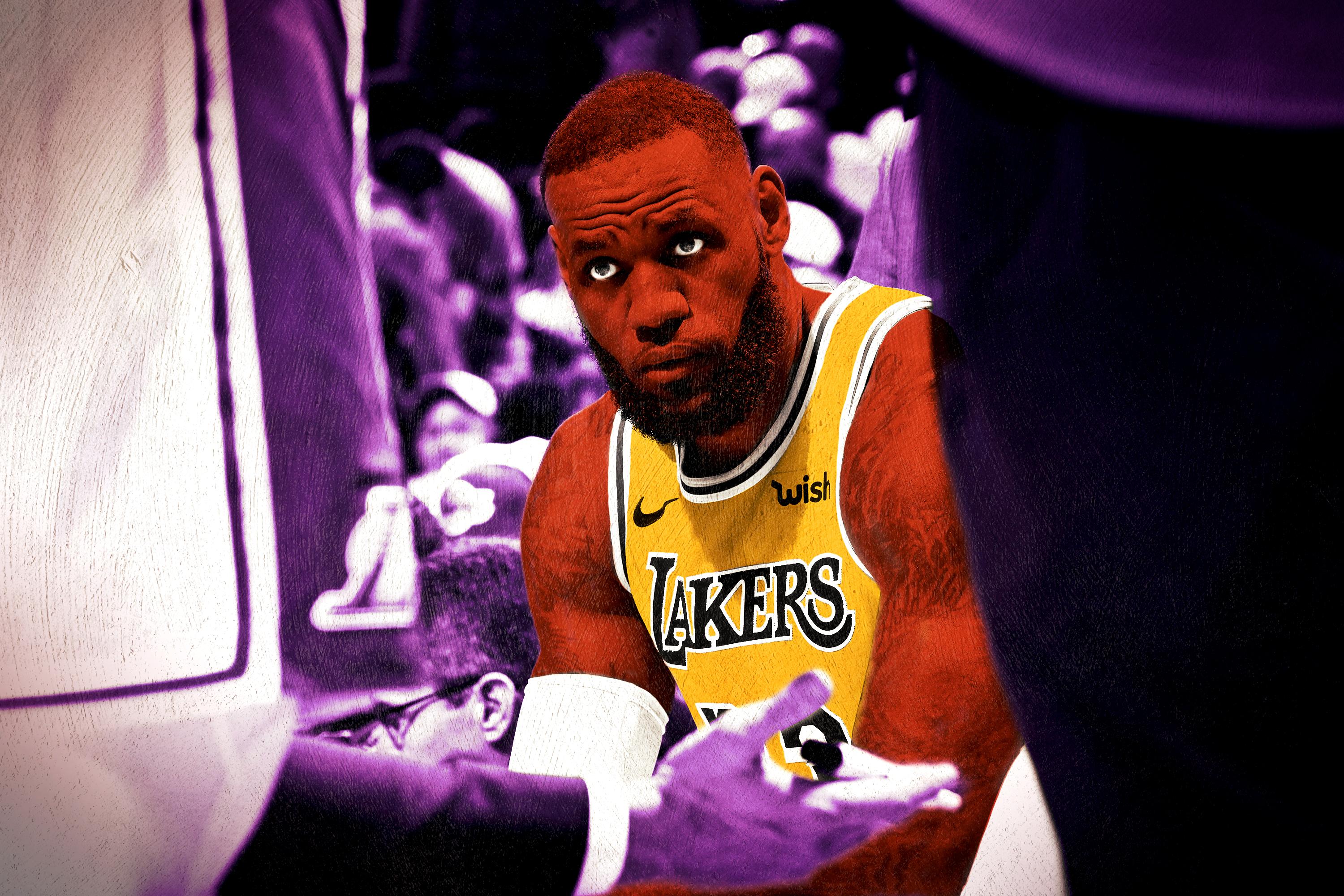
It’s unclear what the postseason would look like without LeBron James. The last time he didn’t make the Finals, Steph Curry was a rookie; the last time he didn’t make the playoffs at all, Shaun Livingston and Andre Iguodala, Curry’s old-head teammates, were rookies.
But when the post-All-Star schedule begins this Thursday, LeBron’s Los Angeles Lakers will be in 10th in the West, three games behind the eighth-place Clippers and two behind the ninth-place Kings. The Lakers have the worst record in California, with one more loss than win; they’ve allowed more points than they’ve scored; they hold just a 25 percent chance of reaching the playoffs, according to FiveThirtyEight; and they went from possibly landing Anthony Davis at the trade deadline to adding Reggie Bullock and Mike Muscala instead.
James’s postseason legacy is already secure, with one highlight-reel-leading block, three titles, and eight consecutive Finals trips on his ledger. Thanks to the NBA’s expanded playoff structure and his own consistency and longevity, he already holds the lead in career playoff points, minutes, field goals made and attempted, steals, and win shares. But LeBron’s ongoing playoff thread might soon become undone, and if it does, the questions will unspool from there—about L.A.’s future, Davis’s and Kyrie Irving’s and Kawhi Leonard’s futures, and, most importantly, James’s own future. More than anything, though, a postseason without the King would look just plain strange.
The Lakers could still fly through their remaining tough schedule and render all this fretting moot. (It wouldn’t be the first time a LeBron team recovered from an extended slump.) But in the apparent likelihood that L.A.’s playoff drought swallows LeBron’s playoff streak, here are three questions about the historical repercussions.
1. Would LeBron be the best player to miss the playoffs in his prime?
Well, sure, because Michael Jordan didn’t miss the playoffs in his prime. But let’s expand the possibilities beyond that twosome and zoom through the sport’s pantheon-level players, as ranked in the boss’s Book of Basketball.
• Jordan didn’t miss the playoffs until his second return from retirement, when he played two seasons for the Wizards at age 38 and 39. He also missed the playoffs in 1994, when he played minor league baseball, but that doesn’t count.
• Bill Russell and Magic Johnson never missed the playoffs, with each playing 13 seasons.
• Larry Bird, Tim Duncan, and Jerry West skipped the playoffs just once each—but each “miss” comes with a caveat, because they all suffered season-ending injuries in the campaigns in question.
• Shaquille O’Neal missed the playoffs only in his rookie and age-36 seasons, so he qualified in every year of his prime.
• Moses Malone missed the playoffs as he entered his prime at age 22 and as he left his prime at age 34. His only miss at his peak resulted from a season-ending injury for the 1985-86 Sixers.
Yet about half of the all-time greats experienced a blip like LeBron might this season, even amid their own statistical dominance:
• Kareem Abdul-Jabbar missed the playoffs in his final season in Milwaukee and his first in L.A., even as he averaged an outrageous 29 points, 16 rebounds, five assists, four blocks, and one steal per game across those two seasons.
• Wilt Chamberlain missed the playoffs just once, in 1962-63, when the San Francisco Warriors went 31-49 despite his 45 points and 24 rebounds per game.
• Kobe Bryant missed the playoffs in his last few seasons following 2013’s Achilles rupture, but the only miss in his prime came in 2004-05, when the post-Shaq Lakers squandered his 28 points, six rebounds, and six assists per game.
• Oscar Robertson missed the playoffs as a rookie and then in his last three seasons with the Cincinnati Royals, even though he averaged 26 points, nine assists, and six rebounds per game in that span.
• Hakeem Olajuwon missed the playoffs just once before his late 30s—in 1991-92, when his 22 points, 12 rebounds, and four blocks per game weren’t enough for the Rockets.
All five of those players recovered from their playoff misses to win one or more titles. Of course, LeBron, 34, is older than they were. It’s possible that we’ll look back on James’s 2018-19 season as the beginning of his end rather than a continuation of his long-extended prime, but he’s bent the aging curve plenty already.
2. Who managed a longer playoff streak than LeBron has?
If LeBron’s Lakers rebound and qualify for this postseason, he’ll extend his personal playoff streak to 14 years—vaulting him into a tie for 10th place in history. It’s a bit of a surprise that so many players are ahead of him on this list. They fall into two categories.
First are the superstars who were so skilled—and who played for such enviably consistent franchises—that they metronomically made the playoffs year after year. Duncan (who played in 16 straight postseasons) and Shaq (15) fit this group. So do John Stockton and Karl Malone, who hold the record, with 19 trips in 19 career seasons. Jason Kidd reached the playoffs in his last 17 seasons, Scottie Pippen in his first 16, Clyde Drexler in all 15 of his, and Dolph Schayes in his first 14.
Then there are the role players. Robert Horry never missed the playoffs in his 16-season career. Rasheed Wallace and Clifford Robinson produced streaks of 14 years. And tied with LeBron are names like Charles Oakley and Dennis Johnson. All were fine players in their own right—Johnson even made the Hall of Fame—but, more importantly, they continually found themselves in the right places at the right times.
It’s no surprise, either, that basically all of these players produced an indelible playoff memory (or memories, plural). With so many opportunities in so many consecutive years, they were bound to do so—and, in the case of someone like Horry, elevate his standing from fortunate journeyman to playoff legend.
3. Which active players might challenge LeBron’s streak?
LeBron doesn’t actually own the longest active playoff run. That honor belongs to Tony Parker, who is 17-for-17 in playoff tries but now might snap the streak in his first season away from San Antonio. Parker has produced historically impressive per-36 numbers (18.9 points, 7.6 assists) on Charlotte’s second unit, but according to FiveThirtyEight’s model, the Hornets have just a 49 percent chance of qualifying for the playoffs. They sit in seventh place in the East at the break, but just one game separates the Hornets from 10th place, and they rank 25th in net rating—just one spot behind the Lakers!—since the start of 2019.
After Parker and James, the next-longest active streak belongs to JJ Redick, whose run will hit 13 as he plays into this postseason with Philadelphia. Another dozen players are also working on active streaks of six or longer. Only Jeff Teague, on the middling Timberwolves, is in real danger of losing his run this spring.
Longest Active Playoff Streaks
The likes of Redick and Mills haven’t themselves defined the last decade of NBA playoffs like LeBron has, but their ubiquity speaks volumes about the league’s evolution nonetheless. Redick played for Stan Van Gundy’s Magic teams that surrounded a true center with four shooters years before that style took over the NBA; after a brief pit stop in Milwaukee, he played for the could’ve-should’ve Lob City Clippers; he now plays for a 76ers team that similarly experiments with the geometry of the court. Mills blossomed in the final days of the Duncan-Parker-Ginobili Spurs before continuing to reach the playoffs with a brand-new cast of leading men. And so on—it doesn’t seem like a coincidence that the longest streaks in today’s shooting-inclined league come from guards and wings instead of bigs.
But none of those active players—at least until the lower rungs, where the likes of Paul and Curry reside—carried their teams for the entirety of their playoff runs like LeBron has. Even Parker and Harden, Hall of Fame–level players in their own right, served more as supporting members for stretches. LeBron’s streak encompasses a career’s worth of unrelenting regular-season and playoff success—and all it took is a move out West, perhaps, to end it, or at least cause a serious, streak-busting stumble.

